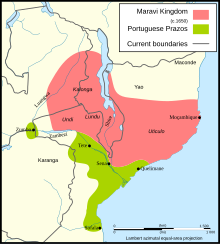| Revision as of 05:24, 22 January 2014 editMrSativa (talk | contribs)Extended confirmed users908 editsNo edit summary← Previous edit | Revision as of 10:13, 8 February 2014 edit undoBrigade Piron (talk | contribs)Autopatrolled, Extended confirmed users47,437 edits added Category:16th century in Africa using HotCatNext edit → | ||
| Line 20: | Line 20: | ||
| ] | ] | ||
| ] | ] | ||
| ] | |||
| {{Africa-hist-stub}} | {{Africa-hist-stub}} | ||
Revision as of 10:13, 8 February 2014

Maravi was a state established by the Bantu Chewa people, descendants of the Amaravi, in the area of Lake Malawi, in present-day Malawi, in the 16th century. The present-day name "Malawi" is said to derive from "Maravi" which itself means "fire flames".
At its greatest extent, the state included territory from the Tumbuka and Tonga areas to the north to the Lower Shire in the south, and west to Luangwa and Zambezi valleys. Maravi's rulers belonged to the Phiri matriclan and held the title Kalonga. They ruled from Manthimba, the secular/administrative capital, and were the driving force behind the state's establishment. Meanwhile, the patrilineal Banda clan, which traditionally provided healers, sages and metallurgists, took care of religious affairs from their capital Mankhamba near Nthakataka.
After contact with the Portuguese, trade intensified. It included such items as beads of the Khami type and Chinese porcelain imported via Portuguese intermediaries. In the 19th century, the state declined and the Maravi were frequently raided by their neighbors the Yao and captured for sale as slaves. David Livingstone visited Lake Nyasa in 1859, and Protestant missionaries soon followed.
"Maravi" is therefore a general name of the peoples of the lake in Malawi, Zambia, Zimbabwe, and Mozambique. They speak several languages, including Chichewa (Malawi’s national language), Nyanja, Tumbuka, Senga, Nsenga, and speak other official languages: Portuguese in Mozambique and English in Malawi, Zambia, and Zimbabwe.
See also
External links
This African history–related article is a stub. You can help Misplaced Pages by expanding it. |
This Malawi-related article is a stub. You can help Misplaced Pages by expanding it. |
This Mozambique-related article is a stub. You can help Misplaced Pages by expanding it. |